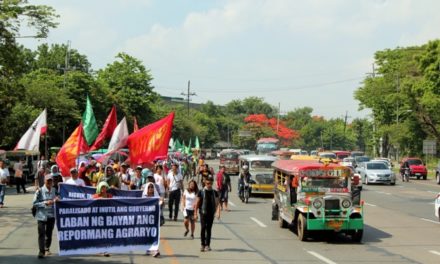1 July 2003
Mr. Chairman, it is with much interest and concern that we followed the debates last week and today. While our interest has surely not flagged, our concern has grown as many of the developed country members continue to maintain their respective stands on their own versions of further trade liberalization without due regard and, more importantly, linkage to the other pillars mandated for equally quantum reforms in the so-called Doha
Development Agenda.
Given that the prime target of what appears to be obsessive market insecurity of these countries is our developing country markets, this delegation cannot be a party to the fulfillment of such an obsession without symmetric reform commitments in trade distorting export competition and domestic support measures. Or as your draft’s [the Harbinson draft] architecture suggests and implies, without the two windows of flexibility in SPs (special products) and SSM (special safeguard mechanisms) for condoning the persistence of trade distorting support in these other two pillars.
Mr. Chairman, we have waited for crucial domestic policy decisions to be made by two major players to these negotiations with the hope of breaking the inertia. To the credit of one, such domestic policy decision, upon resolution, has been translated into a comprehensive proposal, though singular on market access, de facto measuring trade liberalization with further tariff reductions, while suffering from anemia in the other two pillars and special and differential treatment (S&D). Nevertheless, we welcomed this development as another important step forward.
The other recently resolved, per the press releases, their common policy on agriculture. As in the case of the first, we welcome this development as a necessary but not sufficient condition to move these currently inert negotiations forward. We have to see, very soon, what these decisions mean in terms of positively moving forward these negotiations.
As these parties appear to insist that their own so-called domestic ‘reform’ programs be the de facto parameters of our global reform commitments in contravention of the Doha Mandate owing to their gross inadequacy of ambition in trade distorting support, developing countries like the Philippines have no choice but to insist on the availability of adequate flexibilities afforded by appropriate provisions on SPs and SSM.
These cannot provide the balance and equity that has so preoccupied developing country proposals since the mandated Article 20 phase but without them in the current architecture you propose and in which we have positively and constructively engaged, the whole exercise will just be further exposure of our markets to heavily supported competition to the prejudice of our agricultural economies’ development goals.
We have been asked, Mr. Chairman, about the proper economic justification for SPs. Let me tell colleagues that if these negotiations are robustly hinged on and are about proper economics, the elimination of those persisting trade distorting support and non-tariff barriers should be equally important targets of the reform program. Our agricultural
sectors that are strategic to food and livelihood security and rural employment have already been destabilized as our development program initiatives are frustrated by the gross unfairness of the international trading environment. Even as I speak, our small producers are being slaughtered in our own markets, even the more resilient and efficient are in distress.
At the end of the current implementation period, the Philippines will have no tariffs higher than 50per cent (with the possible exception of one), with most in the 7 – 15per cent range. We have paid our dues well in advance to move this so-called reform program and we cannot afford the political, social and economic consequences of the implosion that would result from an unfair share of the adjustment burden while some continue to wallow in their profligate policies that drown us with trade distortions.
Mr. Chairman, I cannot find a more appropriate economic justification than the survival and the preservation of whatever opportunities exist for our sectors that determine food security, livelihood and employment. Furthermore, our producers also have the right to diversify and fully express their competitiveness beyond our markets. I dare add, Mr.
Chairman, that these are far more robust justifications than those that have been advanced in allowing the persistence of trade distorting support, now under the skirt of the political policy parameters of the developed [countries].
In view of the foregoing, Mr. Chairman, the Philippines is of the position that SPs, along the lines you defined be self-declared, as one country’s policy measures to attain sustained food and livelihood security and rural development cannot be competently dictated nor prescribed by any multilateral negotiation. On the other hand, the issue that needs to be negotiated should be that limited number of tariff lines at the 4-digit level. Further, due to the very nature of SPs, we further propose their automatic recourse to the SSM.
With regard to special safeguards, Mr. Chairman, we agree that the provisions of Article 5 of the subsisting Agreement should cease to apply for developed countries, period. Since special safeguard measures are intended to counter the surge in imports which may result from further market opening, access to the application of measures, either volume or price triggered, must be linked to the degree of market access. The proper issue that needs to be negotiated is therefore the threshold level of tariffs below which there should be universal access to special safeguard measures.
Mr. Chairman, we have been told that the only flexibility developing countries need is the SSM that must be targeted to the tariff lines we propose to be covered by SPs. Mr. Chairman, this, at the very least, represents a poor understanding of developing country agriculture and political economy, and, at its worst, the ultimate in insensitivity. SSM addresses the susceptibility of developing country markets to the peculiar perturbation of import surges, while SPs enable us to ensure the survival and nurture of our strategic agricultural sectors in an international trading environment jaundiced by trade distortions.
Mr. Chairman, some parties to these negotiations pull developing countries in opposite directions on the issue of further tariff reductions: one would have us cut so mechanically that it is S&D-blind and the other would freeze us in the present medieval world of tariff peaks and tariff escalation. We can live with your proposed multi-band formulae. You can at least address tariff peaks by an upward revision in the upper bands.
Mr. Chairman, we exhort you and colleagues to engage more intensively and aim for a mature set of modalities in these two crucial areas in the next few weeks, that what we bring to Cancun may be incomplete but already properly developmental in character as Ministers mandated. Rather than outright dismissal, we exhort colleagues, particularly the developed countries, to positively and constructively engage. You have arrived at your policy parameters as we already have ours: it is time we commence in earnest our travel to the East.
Thank you Mr. Chairman.




![[IN PHOTOS] In Defense of Human Rights and Dignity Movement (iDEFEND) Mobilization on the fourth State of the Nation Address (SONA) of Ferdinand Marcos, Jr.](https://focusweb.org/wp-content/uploads/2025/07/1-150x150.jpg)



